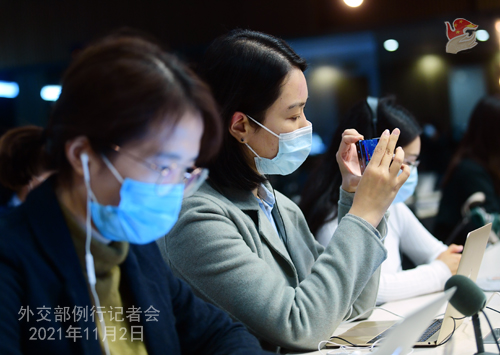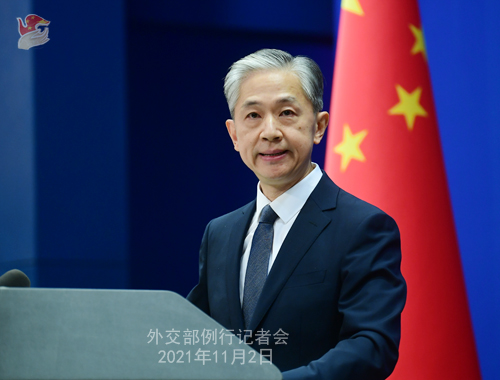
Xinhua News Agency: The World Leaders Summit at the 26th session of the Conference of the Parties to the UN Framework Convention on Climate Change is held in Glasgow, the UK, from November 1 to 2. President Xi Jinping delivered a written statement to elaborate on China’s propositions on climate governance and share China’s achievements and contributions in climate governance. Could you offer more information?
Wang Wenbin: The 26th session of the Conference of the Parties (COP26) to the UN Framework Convention on Climate Change (UNFCCC) is held in Glasgow, the UK, from October 31 to November 12. The UK hosts the World Leaders Summit on November 1 and 2. President Xi delivered a written statement at the summit.
In this statement, he offered China’s solution to major tasks of our times including how to address climate change and revitalize the world economy. He put forward three propositions, namely, upholding multilateral consensus, focusing on concrete actions, and accelerating the green transition. He stressed that China, guided by the vision of a community of life for man and Nature, is committed to a green and low-carbon development path that gives priority to ecological conservation. The “1+N” policy framework has identified the timetable, roadmap and blueprint for China’s carbon peaking and carbon neutrality.
President Xi’s statement demonstrates China’s sense of responsibility as a major country in actively addressing climate change and leading global climate governance. It has been highly acclaimed by the international community. Just as President Xi emphasized, “successful governance relies on solid action”. China stands ready to work hand in hand with the international community to tackle the climate challenge, protect the planet we all call home and foster a community of life for man and Nature.
Reuters: Why did the Chinese leader only deliver an address at the opening leaders’ segment of COP26 in written format, and not via video link?
Wang Wenbin: As I understand, the host of the conference did not provide the option to participate by videoconference. What I want to stress is that President Xi Jinping's written statement to COP26 demonstrates China's firm position to actively promote international cooperation on climate change and protect the planet we all call home and its sense of responsibility as a major country. China's proposals and measures have been highly praised and recognized by the international community.
MASTV: Antiy Labs, an anti-virus company of China, announced that a number of phishing activities and cyber attacks targeting China and countries in the South Asian Subcontinent have been busted this year with India-based hackers behind attempts to launch attacks on China's defense and military units as well as state-owned enterprises. The analysis report will soon be published. Do you have any response?
Wang Wenbin: I would like to refer you to the competent authorities of cybersecurity for the specifics. As a principle, China stands against all forms of cyber attacks.
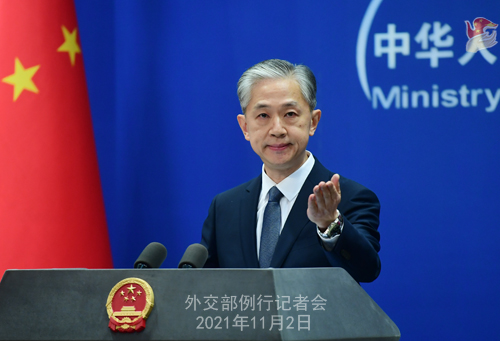
Yonhap News Agency: I have two questions. It is reported that China and Russia recently circulated a draft resolution on the DPRK at the UN Security Council. Can the foreign ministry share more information on the content? Also, Yang Jiechi, Member of the Political Bureau of the CPC Central Committee, met with the DPRK’s ambassador to China last week, and Special Representative of the Chinese Government on Korean Peninsula Affairs had a video conference with his ROK counterpart yesterday. Can you share more information on what China has done to encourage the DPRK to return to dialogue and negotiation and China’s expectation in this regard?
Wang Wenbin: On your first question, China and Russia circulated a DPRK-related draft resolution at the Security Council last Friday. The current situation on the Korean Peninsula is complicated and sensitive with the political settlement process at a standstill. The main consideration behind China and Russia’s decision to put forward this draft resolution at this point lies in the following aspects. First, it is aimed to strengthen the trajectory of a political settlement to the Korean Peninsula issue and create an enabling atmosphere to facilitate the early start of dialogue. Second, given that the DPRK has taken multiple denuclearization measures in recent years, its legitimate and reasonable concerns deserve attention and response. Third, the negative impact of international sanctions and COVID-19 on the DPRK’s economy and people’s livelihood is a cause for concern, so the Security Council should facilitate external support and assistance to the country. Fourth, the Security Council should activate provisions on modifying sanctions in DPRK-related resolutions at an appropriate point to make adjustments to some sanctions concerning the economy and livelihood, which is in line with the spirit of the resolutions. Fifth, to improve inter-Korean relations and promote reconciliation and cooperation is the overriding trend, which the international community and relevant parties should all support by creating necessary conditions. We hope relevant parties will look at the draft resolution by China and Russia with a positive and constructive attitude and make joint efforts to advance the political settlement of the Peninsula issue.
On your second question, China has been playing a constructive role in promoting peace talks on the Peninsula and maintains active interaction and in-depth communication with relevant parties. We firmly uphold peace and stability of the Peninsula, stay committed to promoting peace talks, and support all efforts conducive to easing the situation and facilitating dialogue. The dual-track approach and the phased and synchronized principle put forward by China has received great attention and recognition from all parties. China and Russia jointly proposed a draft resolution at the Security Council on the political settlement of the Peninsula issue, calling for the resumption of talks at an early date. This is very constructive under the current circumstances.
China believes the crux of the Peninsula issue lies in the fact that the denuclearization measures the DPRK has taken have not won due attention, and the country’s legitimate concerns have not received due response. The US should face the crux of the problem squarely, propose attractive plans for dialogue and take real actions instead of simply shouting slogans. China is ready to strengthen communication with all parties on the Peninsula affairs and continue to actively contribute to the political settlement of the Peninsula issue.
Shenzhen TV: According to media reports, Russian Foreign Minister Sergey Lavrov said on November 1 that amid the turmoil in Afghanistan, the US had attempted to persuade Pakistan, Uzbekistan and Kyrgyzstan to allow American forces to be stationed in their territory. All rejected the US proposal. During a meeting between the Russian and US heads of state this June, the Russian side stated explicitly that it categorically opposes US attempts to deploy military bases in Central Asian countries. Does the Chinese side have any comment?
Wang Wenbin: We have noted relevant reports. The countries you mentioned are all SCO members. To safeguard regional peace and stability is the shared objective of all SCO members. Relevant countries maintain close cooperation. The two-decade war in Afghanistan waged by the US has wreaked havoc on peace and stability in Afghanistan and the wider region and led to a huge humanitarian disaster. The US should draw a hard lesson, rectify its belligerent policy, earnestly respect regional countries’ sovereign independence and territorial integrity, act to promote regional peace and stability and avoid repeating past mistakes.
People’s Daily: At the World Leaders Summit at the 26th session of the Conference of the Parties (COP26), more than 100 countries, including China, will join the Glasgow Leaders' Declaration on Forest and Land Use. Could you share more details on that?
Wang Wenbin: Forests are the lungs of our planet and the largest carbon sinks in terrestrial ecosystems. China's participation in the Glasgow Leaders' Declaration on Forest and Land Use demonstrates its resolve and contribution to protecting ecological environment and actively addressing climate change.
Guided by the concept of a community of life for man and Nature, China has taken concrete measures in terms of forest and land use and achieved remarkable results. Against the backdrop of continuous decline of global forest resources, China's forest coverage rate has risen from 12 percent in the 1980s to 23.04 percent today, and its forest stock volume has increased by 8.5 billion cubic meters, registering the largest national increase in forest resources in the world and contributing a quarter of the world's newly forested land.
China has continued its efforts to control desertification, successfully curbed the expansive trend of desertification, realized a historic transformation from “sand forcing humans to retreat” to “trees forcing sand to retreat”, and achieved the goal of zero net land degradation by 2030 set by the United Nations ahead of schedule. China has contributed one-fifth of the world's net restored land area.
Earth is what all human beings call home. China's efforts to protect forests and land has not only greened China but also made the world a more beautiful place. In the face of global challenges such as climate change and biodiversity loss, China is ready to work with other parties to take concrete actions to address crises, resolve difficulties and build a beautiful world where man and Nature coexist in harmony.
CCTV: China has applied to join the Digital Economy Partnership Agreement (DEPA) on November 1. Could you share China’s consideration and tell us the significance of this decision?
Wang Wenbin: President Xi Jinping announced that China has decided to apply to join the Digital Economy Partnership Agreement during his attendance at the 16th G20 Leaders’ Summit. China yesterday submitted the application to New Zealand, the depositary for the DEPA. This showcases China’s constructive attitude in actively participating in international cooperation on digital economy and relevant rules-making and reflects China’s firm resolve to expand opening-up and align with high-standard international rules.
China is an active advocate of regional economic cooperation, a staunch defender of multilateral economic and trade rules and a strong promoter of an open world economy. China has been firmly committed to deepening reform and opening-up, actively participating in improving international economic and trade rules, and promoting regional economic integration and trade and investment liberalization and facilitation. China was one of the first countries to ratify the Regional Comprehensive Economic Partnership (RCEP) and has formally applied to join the Comprehensive and Progressive Trans-Pacific Partnership (CPTPP) to further enhance its commitment to opening-up. At the just-concluded leaders' meetings on East Asia cooperation, China called for deepening economic integration and promoting the early entry into force and implementation of the RCEP to bring benefits to people in the region, which has received positive response from regional countries.
In just several days, the 4th China International Import Expo (CIIE) will open in Shanghai. This year, a total of 58 countries and three international organizations will join the country exhibition during the expo, and nearly 3,000 businesses from 127 countries and regions will attend the business exhibition. The numbers of participating countries and businesses are both higher than those at the previous expo. China will continue to take concrete actions to support the multilateral trading system, promote the building of an open world economy and make new contributions to global economic recovery and common development of all countries.
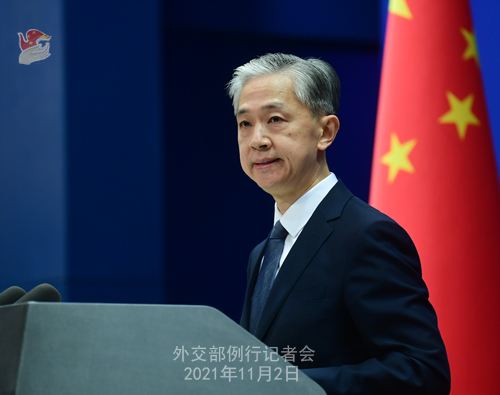
Bloomberg: A question about the statement of the Foreign Correspondents Club of China (FCCC) issued on November 1. It voiced concerns about the foreign media coverage environment for the Beijing Winter Olympics and called on the Beijing 2022 Olympic Organizing Committee and the IOC to improve conditions and access. Does the foreign ministry have any comment on this?
Wang Wenbin: First of all, China does not recognize the organization you mentioned. It cannot represent the genuine voice of the over 400 foreign journalists in China.
The statement you mentioned is not based on facts. The preparation of the Beijing Winter Olympic Games follows the principle of openness. From the outset of the preparation work, we have always welcomed media outlets from across the world for reporting and coverage. With the ongoing pandemic, in order to protect the health and safety of all parties attending the Experience Beijing test matches in the second half of 2021 and to lower the cost for media operation by reducing the number of people that need to be put in quarantine after the matches, the organizing committee of the test matches made thoughtful arrangements and the organizing party overcame huge difficulties to divide the space into two sections, one under outside-loop management and one under in-loop management, and put the media reporting area under outside-loop management. Because of the limited space of the stadiums and venues, not all media organizations are invited to report on every test match.
The principle to follow when inviting media outlets is that only international news agencies recognized by the IOC, the IOC’s official photographic agency, and some media from countries that hosted Olympic Games in recent years or will do so in the coming years are granted access. They can represent the majority of media organizations and meet their needs. In the meantime, the Beijing Organizing Committee provides Newsletter as the matches progress and sends information to all overseas media outlets. There is no such thing as inadequate disclosure of information.
We understand that media organizations are paying much attention to the preparation of the Beijing Winter Olympics and welcome more coverage on the relevant work. To meet the needs of the media, the Beijing Organizing Committee is making active coordination to organize a series of reporting in the three competition zones without affecting the ongoing test matches. Most of the media outlets invited will be overseas resident media in Beijing who have not participated in the test matches. To accommodate the reporting demand of the media, the organizing committee overcame difficulties by coordinating the venues and stadiums to expand the media operation space and has added more media outlets to the list of invitation on the basis of conditions on the ground.
Phoenix TV: Two questions. First, US National Security Advisor Jake Sullivan referred to China as a significant outlier on climate action and said the US will continue pressing on that. How do you respond to this? Second, reports show freight trains have resumed operation between Afghanistan and China. China has provided emergency humanitarian assistance to Afghanistan. The Afghan Taliban interim government yesterday announced that it has exported pine nuts to China. Can you confirm the reports and share more information?
Wang Wenbin: On your first question, President Xi Jinping said at the 16th G20 Leaders' Summit that China has all along undertaken due international responsibilities commensurate with its national conditions. We have actively advanced the green transition of our economy and raised the ambition of our climate actions on our own initiative. We will honor our words and strive to peak carbon dioxide emissions before 2030 and achieve carbon neutrality before 2060.
China always delivers on its commitments and has made arduous efforts and achieved remarkable progress. China’s carbon intensity in 2020 was 48.4 percent less than that in 2005, which means that China had more than fulfilled its commitment to the international community – to achieve a 40-45 percent reduction in carbon intensity from the 2005 level by 2020. The drop in carbon intensity translates to a total reduction of about 5.8 billion tonnes of carbon dioxide emissions. China has made great effort to advance a green and low-carbon energy transition. Electricity generated by non-fossil energy represented more than one third of the power consumption of the country. The total installed capacity of PV power generation increased by a factor of more than 3,000 compared with 2005, and wind by a factor of more than 200. China has led the world in PV capacity additions for eight consecutive years. In the manufacture of wind power and PV power generation equipment, China is the global leader in terms of technology and output. Recently China has started construction of a batch of large wind power and photovoltaic bases with a combined installed capacity of 30 million kW, marking the beginning of the first phase of projects with an installed capacity of approximately 100 million kW. As I said yesterday, developed countries generally set a timeframe of 40 to 70 years to move from carbon peaking to carbon neutrality while China, the largest developing country in the world, only gives itself 30 years. China’s carbon neutrality targets are fully consistent with the Paris Agreement goal of holding global average temperature increase to well below 2°C above pre-industrial levels and pursuing efforts to limit the temperature increase to 1.5°C above pre-industrial levels. They also fully demonstrate China’s climate ambition and global leadership commensurate with its development stage and national realities.
I would also like to stress that as a challenge to all humanity, climate change bears on the future of us all and thus requires joint actions of the international community. Developed countries have unshirkable and historical responsibility since they have been releasing a tremendous amount of greenhouse gases into the atmosphere for the past 200 years or so. In particular, the US, a major emitter in history, has seen reversal and retrogression in its climate policy. Its emissions peaked and began to decline only in recent years. We are looking forward to concrete emissions reduction policies and measures rolled out by the US as soon as possible. Developed countries should earnestly follow the principle of common but differentiated responsibilities, take the lead in fulfilling emission reduction obligations, and provide financial, technological and capacity building support to help developing countries enhance their capacity to respond to climate challenges. They should also stop asking China to reduce the use of coal while sanctioning Chinese photovoltaic companies.
On your question about Afghanistan, freight trains between China and Afghanistan have never been suspended. Agricultural trade between the two countries is recovering. The small pine nuts, while bringing an exotic delicacy to the Chinese people, also fetch foreign exchanges for Afghanistan every year and alleviate the difficulties facing a large number of Afghan farmers as a means of living. The “air corridor of pine nuts” captures China-Afghanistan friendship that goes way back and economic and trade cooperation that grows steadily.
As we speak, Afghanistan still faces grave humanitarian crisis and economic difficulties. China has announced to provide 200 million yuan worth of emergency humanitarian assistance for Afghanistan and our first batch of emergency humanitarian assistance supplies has arrived in Kabul. China will continue to listen to the appeal and demand of the Afghan people, provide support and assistance for them to the best of our abilities and play a constructive role in helping Afghanistan regain stability and achieve development.
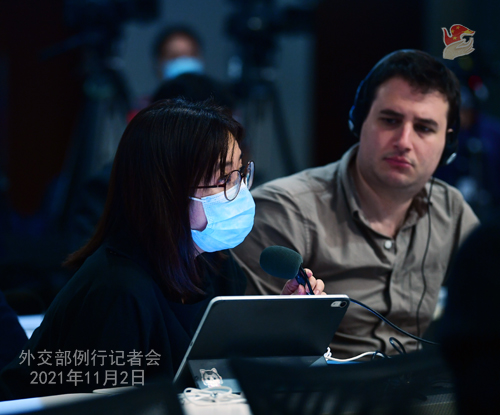
AFP: Could you confirm reports that three Chinese workers were rescued from kidnappers in Mali? And would you be able to share any details about this case?
Wang Wenbin: The Chinese government attaches great importance to the kidnapping of three employees of a Chinese company in Mali. Since the kidnapping happened, the Ministry of Foreign Affairs and the Chinese Embassy in Mali have been closely following the development of the case, continuously urging the Malian side to make all-out efforts for rescue, and guiding the enterprise concerned to properly respond. Thanks to the joint efforts of all parties, the three abductees were safely rescued on November 1 and are now in good health. We thank the governments of Mali and relevant countries for their efforts and support for the safe rescue of the Chinese nationals.
The Foreign Ministry and the Chinese Embassy in Mali will continue to comfort and take care of those rescued. At the same time, we will further heighten risk alert and consular protection for Chinese citizens and enterprises in Mali, and earnestly safeguard their safety and legitimate rights and interests.
Global Times: According to media reports, French President Macron said in an interview with an Australian media outlet during the G20 Summit that Australian Prime Minister Morrison lied to the French side on the nuclear submarine contract. Whether he will trust the Australian side again will depend on what Morrison delivers, he added. Do you have any comment?
Wang Wenbin: China has clearly stated its principled position on Australia’s nuclear submarine cooperation with relevant countries. Australia should not only give honest answers to its partner’s questioning, but also honestly face up to the international community’s concerns, earnestly fulfill its non-proliferation obligations, and stop such irresponsible behavior as creating bloc confrontation and proliferation risks.
CRI: The WTA Best Practices of Rural Revitalization Through Tourism 2021 was released in Beijing recently. Do you have any comment?
Wang Wenbin: The World Tourism Alliance (WTA) recently released the WTA Best Practices of Rural Revitalization Through Tourism 2021. This report fully demonstrates the excellent achievements of China's rural revitalization through tourism, and puts forward suggestions on rural revitalization based on in-depth analysis, summary and research. The release of the report is part of the series of activities to commemorate the 50th anniversary of the restoration of the lawful seat of the People's Republic of China in the United Nations. It is also an important measure taken by China to implement the UN 2030 Agenda for Sustainable Development in tourism and promote mutual learning among countries in this area.
The Communist Party of China and the Chinese government always attach great importance to rural work. We have introduced a host of policies and measures to accelerate rural infrastructure construction and public service improvement and stated clearly that we must continue to make solving problems relating to agriculture, rural areas and farmers the top priority in the Party's work, make comprehensively promoting rural revitalization a major task of realizing the great rejuvenation of the Chinese nation, and mobilize the efforts of the whole Party and society to accelerate the modernization of agriculture and rural areas so that farmers can live a better life. This 50 cases from 31 provinces, autonomous regions and municipalities in China compiled in this report are a vivid illustration of the achievements of the path of socialist rural revitalization with Chinese characteristics and China's unique contribution to global poverty reduction and development.
In this report, there are many success stories of achieving development and revitalization through ecological progress. You can find the inspiring stories of how villages achieved prosperity by implementing the strategy of "village development through ecology" and developing featured tourism of the local ecology, how they converted land once used for industries with heavy pollution to scenic spots through ecological upgrading, and how they made full use of the endowment of local world natural heritages to find ways for heritage protection, rural tourism and sustainable livelihood to integrate with and reinforce one another. These cases are positive outcomes of China's commitment to prioritizing ecological conservation and promoting green and low-carbon development and its effort to build a beautiful country with the harmonious coexistence of man and Nature.
We believe that if we humanity do not fail Nature, Nature will not fail us. Rural revitalization cannot be achieved until the vision of blue sky, green land and clear water is deeply rooted in the hearts of the people. Similarly, the development of China and the world at large cannot be achieved without taking good care of our planet. In the future, we will make unremitting efforts to firmly implement the new development philosophy featuring innovative, coordinated, green, open and shared development, continue to follow through on the UN 2030 Agenda for Sustainable Development, and work with other countries to build a world of harmonious coexistence between man and Nature and a community with a shared future for mankind featuring zero poverty, zero hunger, and common development. We sincerely hope you will look around in China's beautiful rural areas.
South China Morning Post: Yesterday the US Navy released results of the investigation into the collision of USS Connecticut last month. It stated that the submarine grounded on “an uncharted seamount”, not another ship, and suffered serious damage. I wonder if the foreign ministry has any response to this?
Wang Wenbin: We have expressed our grave concern repeatedly over this incident and asked the US side to adopt a responsible attitude, offer a detailed explanation, and provide a satisfactory answer to the international community and regional countries.
What we have seen is that a week after the incident, the US issued an evasive statement, saying the submarine hit an unknown object. Nearly a month after the incident, it said the submarine grounded on an uncharted seamount. It also deliberately used the sweeping term “international waters in the Indo-Pacific region” and has yet to give clear answers to questions like the intention of the operation, the exact location of the incident, whether it lies in the exclusive economic zone or territorial sea of any country, and whether the collision led to a nuclear leak or polluted the marine environment, all causing great concern and doubt. This fully exposed the US lack of transparency and responsibility.
We once again urge the US to give a detailed description of the incident and fully address regional countries’ concern and doubt. The key is to stop deploying military aircraft and warships to harass and provoke others and flex muscles, and to stop harming other countries’ sovereign security, otherwise it will be inviting more, not fewer, similar incidents.
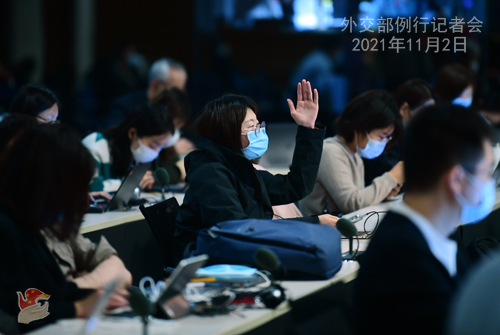
Bloomberg: Can the Foreign Ministry confirm if a fertilizer company in Sri Lanka secured a court order to block payment to a Chinese company over a shipment of fertilizer found to be contaminated?
Wang Wenbin: I’m not aware of the specific situation you mentioned. I would like to tell you that China attaches great importance to the quality of exports. With regard to fertilizer trade and cooperation between China and Sri Lanka, the fertilizer concerned had passed tests of third-party agencies assigned by the Sri Lankan side before shipping. At the moment, China and Sri Lanka are working on the issue through communication and coordination.
China Daily: We noted that the 76th session of the United Nations General Assembly (UNGA) recently held a plenary session to review a report of the Human Rights Council. At the meeting, China expressed explicit opposition to politicizing human rights. Could you share more details, including on the role China has played?
Wang Wenbin: As you said, the 76th session of the UNGA recently held a plenary session to review a report of the Human Rights Council, and the Third Committee had an interactive dialogue with the President of the Human Rights Council. China worked with many countries at the meeting to jointly oppose politicizing the issue of human rights and taking advantage of the human rights issue to interfere in other countries’ internal affairs.
The representative of China pointed out that human rights is not a patent held by a few Western countries, but rights enjoyed by people in all countries. The Human Rights Council is a platform to conduct constructive dialogue and cooperation on human rights issues, not an occasion to create disputes and stoke political confrontation. The work of the Council is now faced with challenges posed by aggravating politicization of human rights issues, inadequate input in economic, social and cultural rights and the right to development, an excess of country-specific human rights resolutions and mechanisms, and the violation of the principles of objectivity and impartiality by some special procedures. China firmly opposes politicizing human rights and adopting double standards on this issue, as well as interference in other countries’ internal affairs in the name of human rights.
Venezuela delivered a statement on behalf of the Group of Friends in Defense of the Charter of the United Nations, of which China is also member. Russia, Pakistan, Egypt, Cuba, Syria, India, Indonesia, Iran, Algeria and other countries all spoke up. They called for respect for the sovereignty and territorial integrity of member states and an immediate stop to politicization of and double standards on human rights. They also rejected interference in the internal affairs of member states and voiced grave concern over the proliferation of country-specific human rights mechanisms, increasing frequency of failure in reaching consensus on Human Rights Council resolutions, and special procedure experts’ deviation from the principle of objectivity and impartiality. They called on the Council to pay more attention to unilateral coercive measures, racism and terrorism and urged special procedure experts to adhere to their code of conduct. It is a strong voice for justice in line with the aspiration of the international community at a multilateral platform.
China stands ready to work together with other countries to advocate adherence to the purposes and principles of the UN Charter and basic norms of international relations, jointly check the morbid tendency to politicize human rights issues, and work relentlessly for the lofty cause of human rights for all.
Beijing Youth Daily: According to an NPR poll, 81 percent of US adults say the future of US democracy is under threat. I wonder if you have any comment on this?
Wang Wenbin: I have noticed relevant reports and have no intention to comment on the American people’s perception of their democracy. I would just like to stress that people in all countries have the right to democracy, which is not a patent held by a few countries. Whether a country is a democracy or not should be determined by its own people, not a few captious outsiders. There are many ways to realize democracy. It is impossible to apply one single script to all scenarios. American democracy has its own problems, which can only be resolved by the American people, not other countries.
In the same vein, the path and model a country chooses to achieve democracy should be in keeping with its national realities and stage of development and should be explored and developed by its own people. It runs counter to the very idea of democracy to use one standard and model to gauge whether any given country is democratic or not. To impose one’s own model of democracy on others through force, coercion or pressure is hegemonism disguised as democracy, which is the very opposite of democracy. It will only aggravate division and confrontation and lead to conflict and chaos. This sort of pseudo-democracy and fake democracy is bound to be opposed and rejected by the international community.
